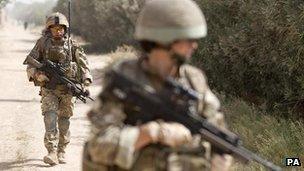Afghan interpreters can come to UK, says Philip Hammond
- Published

Up to 600 Afghans who worked as interpreters or in other dangerous roles supporting allied forces in Helmand will be allowed to resettle in the UK, the government has confirmed.
Defence Secretary Philip Hammond said other locally engaged staff would be able to enrol on training courses and given severance packages.
Afghan workers had "played a vital role" in the campaign, he told MPs.
But campaigners said the plan was "half-baked", with many still at risk.
Translators who have worked for allied forces since the war began in 2001 say they have received death threats and need to leave the country when allied forces are withdrawn.
'Ultimate sacrifice'
The resettlement package will be available only to staff who were in post on 19 December last year, and had served for more than 12 months at that time.
Government sources first said last month the offer would be made.
In his statement to the Commons, Mr Hammond confirmed this, saying: "The government recognises the contribution and commitment of all local staff. They have played a vital role in contributing to our shared goal, a more secure, stable and prosperous Afghanistan.
"Without them, the UK's contribution to the international mission would not have been possible. We pay tribute to those who have made the ultimate sacrifice and those who have been injured whilst working with us."
The government expects around 1,200 Afghans will qualify for some form of redundancy package, including the offer of training supported by a "living stipend" or a severance deal, paid monthly.
Of those, up to 600 may be eligible for the option of resettlement in the UK along with their families.
Mr Hammond said staff had "worked in particularly dangerous and challenging roles in Helmand".
'Lethal'
He added: "In recognition of this unique and exceptional service to the United Kingdom, these local staff and their immediate families will be offered a third option: resettlement in the UK."
Mr Hammond said that staff who did not meet the eligibility criteria but who faced threats to their safety in Afghanistan would be considered for resettlement "in the most extreme cases".
The Avaaz group, which has been championing the interpreters' cause, said the plans would leave hundreds of translators at risk.
Campaign director Alex Wilks said: "This deal may sound great in London, but could be lethal in Kabul.
"Today's Afghan proposal remains half-baked and does not offer the escape route that Iraqi translators received.
"Public pressure has helped throw a lifeline to hundreds of Afghans, but sadly many brave men who've supported British troops risk being left behind."
He added: "If the government applies this deadline of 19 December 2012, then only half the translators will benefit from this deal."
After the Iraq war, the UK gave Iraqi interpreters either one-off financial assistance or exceptional indefinite leave to remain in the UK with help to relocate, or the opportunity to resettle through the UK's Gateway programme run in partnership with the UN's High Commissioner for Refugees.
- Published3 May 2013
- Published1 May 2013
- Published11 February 2013